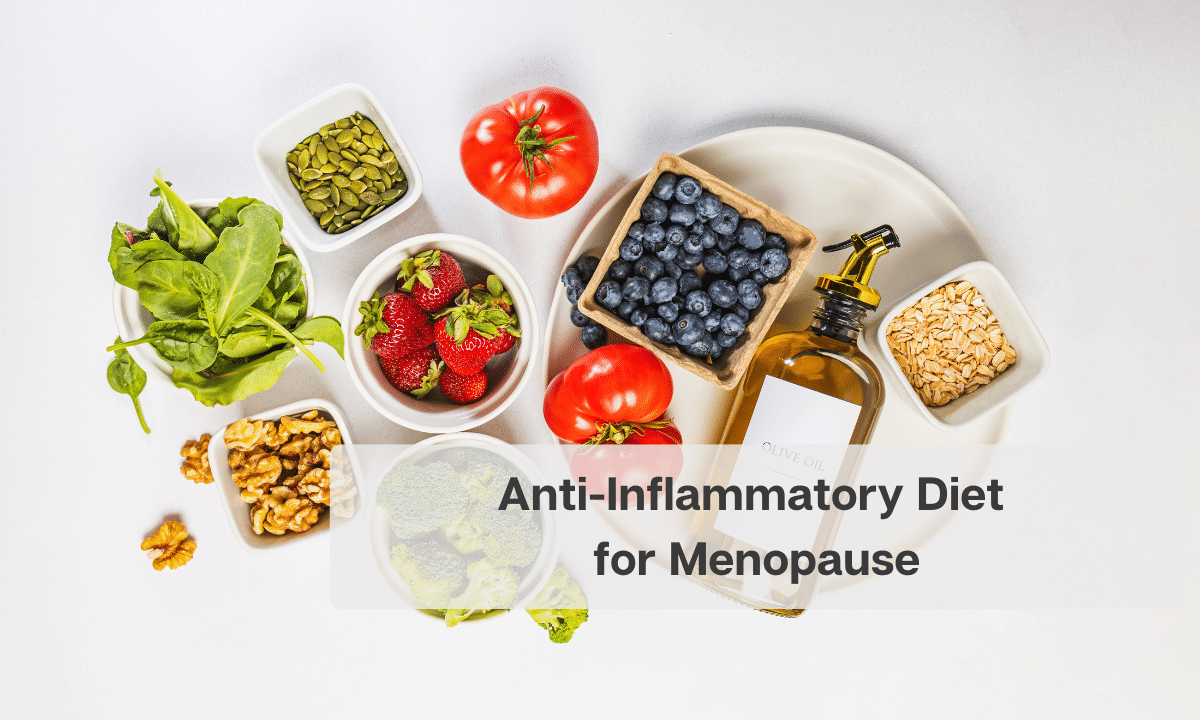Anti-Inflammatory Diet for Menopause
As if dealing with hot flashes and night sweats weren’t challenging enough, menopause can also trigger inflammation, further worsening its symptoms.
Table of Contents
ToggleThankfully, the right diet can help decrease inflammation and better manage these menopausal symptoms.
Menopause and Inflammation
Research suggests that menopause is a pro-inflammatory state, meaning that women in this stage have increased levels of inflammation in their bodies. This is primarily due to a decrease in the hormone estrogen, which plays a key role in regulating the body’s inflammatory response.
These changes worsen or trigger symptoms like weight gain, joint pain, and chronic disease. Recognizing the connection between menopause and inflammation is crucial in understanding the importance of following an anti-inflammatory diet during this life stage.
About the Diet
The anti-inflammatory diet for menopause focuses on consuming foods with properties that naturally fight this response while limiting or avoiding those that can trigger it. This type of diet typically includes a variety of whole, nutrient-dense foods like fruits, vegetables, whole grains, healthy fats, and lean proteins.
On the other hand, it excludes highly processed foods, refined sugars, trans fats, and excessive amounts of saturated fat. These types of foods have been linked to increased inflammation in the body.
Benefits of an Anti-Inflammatory Diet
- Decreases inflammation
- Can improve blood sugar
- Decreases Alzheimer’s risk
- Improves joint pain
- Improves energy and mood
- Plays a role in weight management
- Decreases the risk of heart disease
- Decreases risk of anxiety and depression
- Improves metabolic syndrome
Key Components of an Anti-Inflammatory Diet
The main ingredients of an anti-inflammatory diet are a variety of nutrient-rich foods packed with antioxidants and compounds that help combat inflammation and promote optimal health during menopause.
Foods to Eat
| Proteins | Lean turkey, chicken, and fatty fish (salmon, sardines, herring, mackerel) |
| Legumes | All beans, chickpeas, green peas, lima beans, and lentils |
| Whole grains | Gluten-free oats, quinoa, brown and wild rice |
| Deep yellow or orange vegetables | Carrots, butternut squash, orange and yellow bell peppers, and sweet potatoes |
| Cruciferous vegetables | Red and green cabbage, cauliflower, broccoli, and brussels sprouts |
| Leafy green vegetables | Spinach, arugula, collard greens, kale |
| Other vegetables | Tomatoes, mushrooms |
| Fruit | All berries, oranges, mandarins, grapefruit, peaches, plums, pomegranates, and watermelon |
| Nuts and Seeds | Almonds, cashews, chia seeds, hazelnuts, hemp seeds, pecans, walnuts, and flaxseed |
| Healthy Fats | Avocados, avocado oil, coconut oil, MCT oil, extra virgin olive oil |
| Herbs and Spices | Cinnamon, nutmeg, turmeric, ginger, garlic, cayenne, black pepper, basil, oregano, cumin, thyme, clove, and cinnamon |
Food to Minimize
| Fast Foods | All types of fast food and takeout food |
| Processed Meats | Sausage, deli meats, hot dogs, hamburgers, and other processed meats |
| Processed Snacks | Beef jerky, pretzels, chips, crackers, tortilla chips, and sandwich crackers |
| Certain oils | Processed seed oils and vegetable oils, safflower oil |
| Trans Fats | Products with partially hydrogenated oils, including commercial baked goods such as cakes, cookies, and pies; shortening, fried foods, and some margarine |
| Refined Carbohydrates | White pasta, white bread, white flour, sugary breakfast cereals, pastries, and pizza |
| Sweets | Pastries, doughnuts, croissants, sugary cereal bars, and sweet rolls |
| Desserts | Brownies, candy, cake, ice cream, cookies, pies, and other desserts |
| Sugary Drinks | Soda, cola, fruit drinks and punches, lemonade, energy drinks, and other drinks with added sugar |
| Alcohol | Wine, beer, spirits, cocktails, and especially alcohol mixed with sugar |
Meal Plan
Breakfast:
- Overnight oats with almond milk, topped with fresh berries, chia seeds, and a sprinkle of cinnamon
- Green tea or herbal tea
Mid-Morning Snack:
- Greek yogurt topped with sliced almonds and a drizzle of honey
Lunch:
- Quinoa salad with mixed greens, cherry tomatoes, cucumber, avocado, and grilled chicken or tofu, dressed with olive oil and lemon juice
- Side of steamed broccoli or other green vegetables
- Water or infused water with lemon and mint
Afternoon Snack:
- Sliced cucumber and carrot sticks with hummus
Dinner:
- Baked salmon seasoned with turmeric and black pepper
- Roasted sweet potatoes with rosemary
- Sautéed spinach with garlic and olive oil
- Herbal tea or water with lemon
Dessert (optional):
- Mixed berries and a drizzle of honey
Remember to adjust portion sizes according to your individual needs and preferences, and consult with a healthcare professional or nutritionist for personalized advice.
Lifestyle Factors to Support an Anti-Inflammatory Diet
In addition to dietary changes, adopting lifestyle factors that support an anti-inflammatory diet is crucial, especially after the age of 40.
- Regular Exercise: Engaging in regular physical activity helps reduce inflammation in the body. Aim for a mix of aerobic exercise, strength training, and flexibility exercises.
- Adequate Sleep: Prioritize getting enough quality sleep each night, as poor sleep can contribute to this condition. Aim for 7-9 hours of sleep per night and establish a consistent sleep schedule.
- Stress Management: Chronic stress can trigger inflammation, so practicing stress-reduction techniques such as meditation, deep breathing exercises, yoga, or spending time in nature can be beneficial.
- Hydration: Drink plenty of water throughout the day to stay hydrated and support overall health. Herbal teas and infused water can also provide hydration and additional benefits.
- Limiting Alcohol and Caffeine: Excessive alcohol and caffeine consumption can promote inflammation in the body, so aim to moderate your intake of these beverages.
- Avoiding Smoking and Exposure to Toxins: Smoking and exposure to environmental toxins can contribute to these problems as well as increase the risk of chronic diseases. Quitting smoking and minimizing exposure to toxins will support an overall healthy lifestyle.
- Mindful Eating: Practice mindful eating by paying attention to hunger and fullness cues, savoring each bite, and choosing whole, nutrient-dense foods that support an anti-inflammatory diet.
- Maintaining a Healthy Weight: Excess body weight can contribute to inflammation, so maintaining a healthy weight through a balanced diet and regular exercise is important and will also benefit your health overall.
Incorporating these lifestyle factors along with an anti-inflammatory diet can help optimize your health and well-being while reducing inflammation in the body.
Conclusion
In conclusion, an anti-inflammatory diet offers numerous benefits for women navigating the challenges of menopause.
By incorporating anti-inflammatory foods into your diet and embracing lifestyle factors that support overall health, you can effectively manage symptoms, promote wellness, and thrive during this transformative phase of life.
I hope this blog post is a valuable resource and encourages you to prioritize your health and well-being during menopause and beyond.
Other Helpful Blog Posts
Anti-inflammatory grocery guide
You can also visit the anti-inflammatory section on the blog:
Anti-inflammatory recipes for menopausal women

Dr. Su-Nui Escobar, a Registered Dietitian/Nutritionist in Miami, FL, is dedicated to empowering women in perimenopause and menopause to live healthier, more satisfying lives.
With a doctorate in clinical nutrition from the University of North Florida, she has expertise in menopause and weight loss, including the unique challenges faced by those on weight loss medications.
Su-Nui’s passion for her field is evident in her previous role as the Academy of Nutrition and Dietetics spokesperson.



